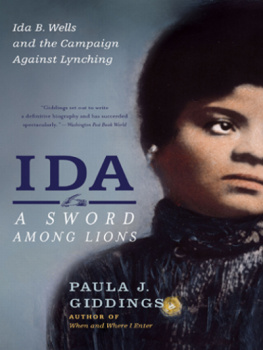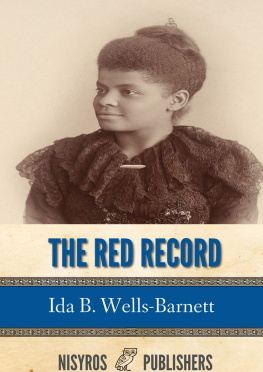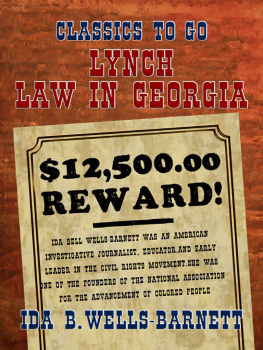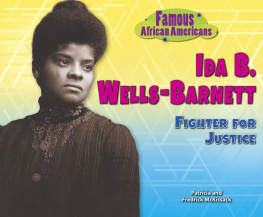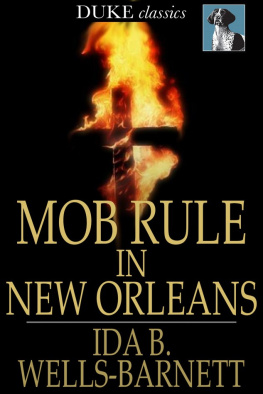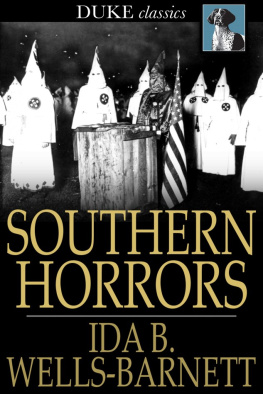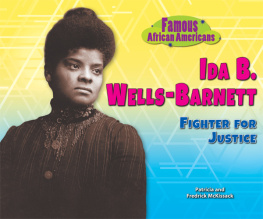Paula J. Giddings - Ida: A Sword Among Lions: Ida B. Wells and the Campaign Against Lynching
Here you can read online Paula J. Giddings - Ida: A Sword Among Lions: Ida B. Wells and the Campaign Against Lynching full text of the book (entire story) in english for free. Download pdf and epub, get meaning, cover and reviews about this ebook. year: 2008, publisher: Amistad, genre: Non-fiction. Description of the work, (preface) as well as reviews are available. Best literature library LitArk.com created for fans of good reading and offers a wide selection of genres:
Romance novel
Science fiction
Adventure
Detective
Science
History
Home and family
Prose
Art
Politics
Computer
Non-fiction
Religion
Business
Children
Humor
Choose a favorite category and find really read worthwhile books. Enjoy immersion in the world of imagination, feel the emotions of the characters or learn something new for yourself, make an fascinating discovery.
- Book:Ida: A Sword Among Lions: Ida B. Wells and the Campaign Against Lynching
- Author:
- Publisher:Amistad
- Genre:
- Year:2008
- Rating:5 / 5
- Favourites:Add to favourites
- Your mark:
Ida: A Sword Among Lions: Ida B. Wells and the Campaign Against Lynching: summary, description and annotation
We offer to read an annotation, description, summary or preface (depends on what the author of the book "Ida: A Sword Among Lions: Ida B. Wells and the Campaign Against Lynching" wrote himself). If you haven't found the necessary information about the book — write in the comments, we will try to find it.
In the tradition of towering biographies that tell us as much about America as they do about their subject, Ida: A Sword Among Lions is a sweepingnarrative about a country and a crusader embroiled in the struggle against lynching: a practice that imperiled not only the lives of blackmen and women, but also a nation based on law and riven by race.
At the center of the national drama is Ida B. Wells (1862-1931), born to slaves in Mississippi, who began her activist career by refusing to leave a first-class ladies car on a Memphis railway and rose to lead the nations firstcampaign against lynching. For Wells the key to the rise in violence was embedded in attitudes not only about black men but about women and sexuality as well. Her independent perspective and percussive personality gained her encomiums as a hero -- as well as aspersions on her character and threats of death. Exiled from the South by 1892, Wells subsequently took her campaign across the country and throughout the British Isles before she married and settled in Chicago, where she continued her activism as a journalist, suffragist, and independent candidate in the rough-and-tumble world of the Windy Citys politics.
In this eagerly awaited biography by Paula J. Giddings, author of the groundbreaking book When and Where I Enter, which traced the activisthistory of black women in America, the irrepressible personality of Ida B. Wells surges out of the pages. With meticulous research and vivid rendering of her subject, Giddings also provides compelling portraits of twentieth-century progressive luminaries, black and white, with whom Wells worked during some of the most tumultuous periods in American history. Embattled all of her activist life, Wells found herself fighting not only conservative adversaries but icons of the civil rights and womens suffrage movements who sought to undermine her place in history.
In this definitive biography, which places Ida B. Wells firmly in the context of her times as well as ours, Giddings at long last gives this visionary reformer her due and, in the process, sheds light on an aspect of our history that isoften left in the shadows.
Paula J. Giddings: author's other books
Who wrote Ida: A Sword Among Lions: Ida B. Wells and the Campaign Against Lynching? Find out the surname, the name of the author of the book and a list of all author's works by series.

